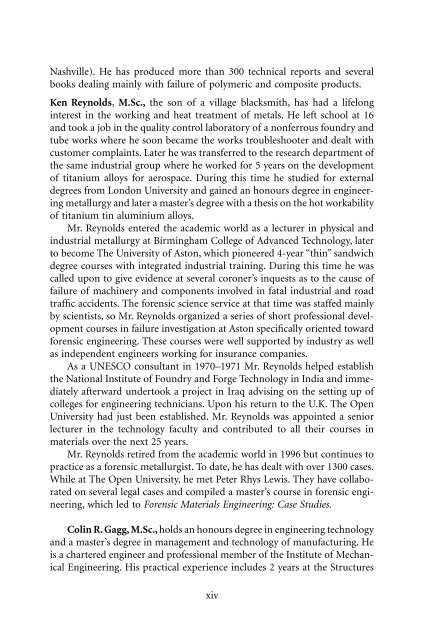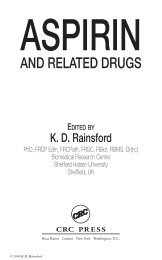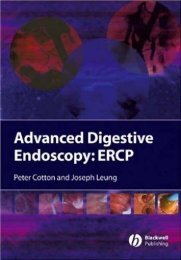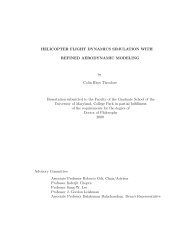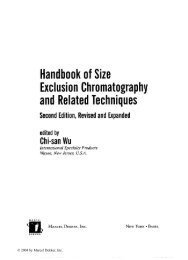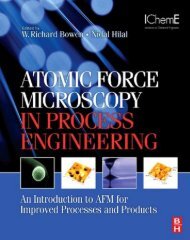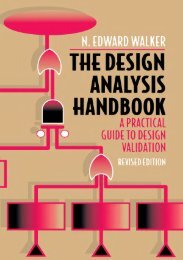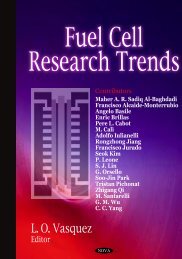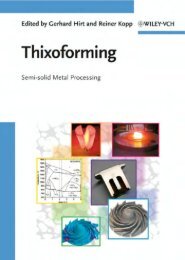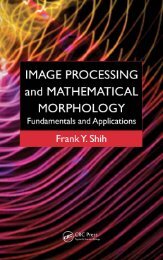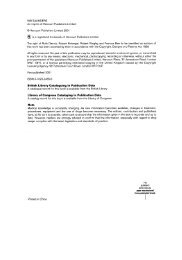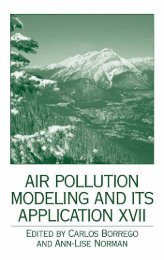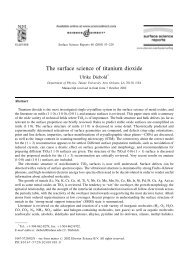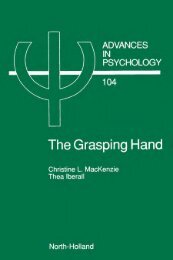- Page 5 and 6: Library of Congress Cataloging-in-P
- Page 8 and 9: Preface Case studies of product fai
- Page 10 and 11: could not be simpler in shape, they
- Page 12 and 13: Acknowledgments We thank The Open U
- Page 16: Laboratories of Imperial College of
- Page 19 and 20: 3 Establishing the Load Transfer Pa
- Page 21 and 22: 6.5.2 A Problem in Eire 197 6.5.3 M
- Page 23 and 24: 9.4.2 Failure in Femoral Stem of To
- Page 25 and 26: 13.3.7 Design Development Sequence
- Page 27 and 28: 2 Forensic Materials Engineering: C
- Page 29 and 30: 4 Forensic Materials Engineering: C
- Page 31 and 32: 6 Forensic Materials Engineering: C
- Page 33 and 34: 8 Forensic Materials Engineering: C
- Page 35 and 36: 10 Forensic Materials Engineering:
- Page 37 and 38: 12 Forensic Materials Engineering:
- Page 39 and 40: 14 Forensic Materials Engineering:
- Page 41 and 42: 16 Forensic Materials Engineering:
- Page 43 and 44: 18 Forensic Materials Engineering:
- Page 45 and 46: 20 Forensic Materials Engineering:
- Page 47 and 48: 22 Forensic Materials Engineering:
- Page 50 and 51: Materials in Distress 2.1 Introduct
- Page 52 and 53: Materials in Distress 27 It is usef
- Page 54 and 55: Materials in Distress 29 (A) Unload
- Page 56 and 57: Materials in Distress 31 1. Flowing
- Page 58 and 59: Materials in Distress 33 to compens
- Page 60 and 61: Materials in Distress 35 Fracture o
- Page 62 and 63: Materials in Distress 37 Force A Fr
- Page 64 and 65:
Materials in Distress 39 Such fract
- Page 66 and 67:
Materials in Distress 41 somewhat b
- Page 68 and 69:
Materials in Distress 43 Figure 2.8
- Page 70 and 71:
Materials in Distress 45 Figure 2.1
- Page 72 and 73:
Materials in Distress 47 Figure 2.1
- Page 74 and 75:
Materials in Distress 49 Stress Amp
- Page 76 and 77:
Materials in Distress 51 Figure 2.1
- Page 78 and 79:
Materials in Distress 53 solutions.
- Page 80 and 81:
Materials in Distress 55 Figure 2.1
- Page 82 and 83:
Materials in Distress 57 Figure 2.2
- Page 84:
Materials in Distress 59 short time
- Page 87 and 88:
62 Forensic Materials Engineering:
- Page 89 and 90:
64 Forensic Materials Engineering:
- Page 91 and 92:
66 Forensic Materials Engineering:
- Page 93 and 94:
68 Forensic Materials Engineering:
- Page 95 and 96:
70 Forensic Materials Engineering:
- Page 97 and 98:
72 Forensic Materials Engineering:
- Page 99 and 100:
74 Forensic Materials Engineering:
- Page 101 and 102:
76 Forensic Materials Engineering:
- Page 103 and 104:
78 Forensic Materials Engineering:
- Page 105 and 106:
80 Forensic Materials Engineering:
- Page 107 and 108:
82 Forensic Materials Engineering:
- Page 109 and 110:
84 Forensic Materials Engineering:
- Page 111 and 112:
86 Forensic Materials Engineering:
- Page 113 and 114:
88 Forensic Materials Engineering:
- Page 115 and 116:
90 Forensic Materials Engineering:
- Page 117 and 118:
92 Forensic Materials Engineering:
- Page 119 and 120:
94 Forensic Materials Engineering:
- Page 121 and 122:
96 Forensic Materials Engineering:
- Page 123 and 124:
98 Forensic Materials Engineering:
- Page 125 and 126:
100 Forensic Materials Engineering:
- Page 127 and 128:
102 Forensic Materials Engineering:
- Page 129 and 130:
104 Forensic Materials Engineering:
- Page 131 and 132:
106 Forensic Materials Engineering:
- Page 133 and 134:
108 Forensic Materials Engineering:
- Page 135 and 136:
110 Forensic Materials Engineering:
- Page 137 and 138:
112 Forensic Materials Engineering:
- Page 139 and 140:
114 Forensic Materials Engineering:
- Page 141 and 142:
116 Forensic Materials Engineering:
- Page 143 and 144:
118 Forensic Materials Engineering:
- Page 145 and 146:
120 Forensic Materials Engineering:
- Page 147 and 148:
122 Forensic Materials Engineering:
- Page 149 and 150:
124 Forensic Materials Engineering:
- Page 151 and 152:
126 Forensic Materials Engineering:
- Page 153 and 154:
128 Forensic Materials Engineering:
- Page 155 and 156:
130 Forensic Materials Engineering:
- Page 157 and 158:
132 Forensic Materials Engineering:
- Page 159 and 160:
134 Forensic Materials Engineering:
- Page 161 and 162:
136 Forensic Materials Engineering:
- Page 163 and 164:
138 Forensic Materials Engineering:
- Page 165 and 166:
140 Forensic Materials Engineering:
- Page 167 and 168:
142 Forensic Materials Engineering:
- Page 169 and 170:
144 Forensic Materials Engineering:
- Page 171 and 172:
146 Forensic Materials Engineering:
- Page 173 and 174:
148 Forensic Materials Engineering:
- Page 175 and 176:
150 Forensic Materials Engineering:
- Page 177 and 178:
152 Forensic Materials Engineering:
- Page 179 and 180:
154 Forensic Materials Engineering:
- Page 181 and 182:
156 Forensic Materials Engineering:
- Page 183 and 184:
158 Forensic Materials Engineering:
- Page 185 and 186:
160 Forensic Materials Engineering:
- Page 187 and 188:
162 Forensic Materials Engineering:
- Page 189 and 190:
164 Forensic Materials Engineering:
- Page 191 and 192:
166 Forensic Materials Engineering:
- Page 193 and 194:
168 Forensic Materials Engineering:
- Page 195 and 196:
170 Forensic Materials Engineering:
- Page 197 and 198:
172 Forensic Materials Engineering:
- Page 199 and 200:
174 Forensic Materials Engineering:
- Page 201 and 202:
176 Forensic Materials Engineering:
- Page 203 and 204:
178 Forensic Materials Engineering:
- Page 205 and 206:
180 Forensic Materials Engineering:
- Page 207 and 208:
182 Forensic Materials Engineering:
- Page 209 and 210:
184 Forensic Materials Engineering:
- Page 211 and 212:
186 Forensic Materials Engineering:
- Page 213 and 214:
188 Forensic Materials Engineering:
- Page 215 and 216:
190 Forensic Materials Engineering:
- Page 217 and 218:
192 Forensic Materials Engineering:
- Page 219 and 220:
194 Forensic Materials Engineering:
- Page 221 and 222:
196 Forensic Materials Engineering:
- Page 223 and 224:
198 Forensic Materials Engineering:
- Page 225 and 226:
200 Forensic Materials Engineering:
- Page 227 and 228:
202 Forensic Materials Engineering:
- Page 229 and 230:
204 Forensic Materials Engineering:
- Page 231 and 232:
206 Forensic Materials Engineering:
- Page 233 and 234:
208 Forensic Materials Engineering:
- Page 235 and 236:
210 Forensic Materials Engineering:
- Page 237 and 238:
212 Forensic Materials Engineering:
- Page 240 and 241:
Failure of Storage Vessels 215 7 Th
- Page 242 and 243:
Failure of Storage Vessels 217 cont
- Page 244 and 245:
Failure of Storage Vessels 219 Figu
- Page 246 and 247:
Failure of Storage Vessels 221 Figu
- Page 248 and 249:
Failure of Storage Vessels 223 Figu
- Page 250 and 251:
Failure of Storage Vessels 225 Figu
- Page 252 and 253:
Failure of Storage Vessels 227 been
- Page 254 and 255:
Failure of Storage Vessels 229 Figu
- Page 256 and 257:
Failure of Storage Vessels 231 Mean
- Page 258 and 259:
Failure of Storage Vessels 233 Figu
- Page 260 and 261:
Failure of Storage Vessels 235 Figu
- Page 262 and 263:
Failure of Storage Vessels 237 Figu
- Page 264 and 265:
Failure of Storage Vessels 239 Stre
- Page 266 and 267:
Failure of Storage Vessels 241 Figu
- Page 268 and 269:
Failure of Storage Vessels 243 Figu
- Page 270 and 271:
Failure of Storage Vessels 245 (Sur
- Page 272 and 273:
Failure of Storage Vessels 247 Were
- Page 274 and 275:
Failure of Storage Vessels 249 Dam
- Page 276 and 277:
Failure of Storage Vessels 251 Bund
- Page 278 and 279:
Failure of Storage Vessels 253 Hull
- Page 280 and 281:
Accidents in the Workplace 255 8 De
- Page 282 and 283:
Accidents in the Workplace 257 ensu
- Page 284 and 285:
Accidents in the Workplace 259 4. F
- Page 286 and 287:
Accidents in the Workplace 261 is a
- Page 288 and 289:
Accidents in the Workplace 263 Figu
- Page 290 and 291:
Accidents in the Workplace 265 be b
- Page 292 and 293:
Accidents in the Workplace 267 Figu
- Page 294 and 295:
Accidents in the Workplace 269 Figu
- Page 296 and 297:
Accidents in the Workplace 271 Figu
- Page 298 and 299:
Accidents in the Workplace 273 8.4
- Page 300 and 301:
Accidents in the Workplace 275 The
- Page 302 and 303:
Accidents in the Workplace 277 (Fig
- Page 304 and 305:
Accidents in the Workplace 279 Figu
- Page 306 and 307:
Accidents in the Workplace 281 Figu
- Page 308 and 309:
Accidents in the Workplace 283 Figu
- Page 310 and 311:
Accidents in the Workplace 285 Figu
- Page 312 and 313:
Failure of Medical Implements 9.1 I
- Page 314 and 315:
Failure of Medical Implements 289 b
- Page 316 and 317:
Failure of Medical Implements 291 F
- Page 318 and 319:
Failure of Medical Implements 293 A
- Page 320 and 321:
Failure of Medical Implements 295 F
- Page 322 and 323:
Failure of Medical Implements 297 9
- Page 324 and 325:
Failure of Medical Implements 299 L
- Page 326 and 327:
Failure of Medical Implements 301 T
- Page 328 and 329:
Failure of Medical Implements 303 N
- Page 330 and 331:
Failure of Medical Implements 305 t
- Page 332 and 333:
Failure of Medical Implements 307 F
- Page 334 and 335:
Failure of Medical Implements 309 F
- Page 336 and 337:
Failure of Medical Implements 311 F
- Page 338 and 339:
Failure of Medical Implements 313 S
- Page 340 and 341:
Failure of Medical Implements 315 T
- Page 342:
Failure of Medical Implements 317 R
- Page 345 and 346:
320 Forensic Materials Engineering:
- Page 347 and 348:
322 Forensic Materials Engineering:
- Page 349 and 350:
324 Forensic Materials Engineering:
- Page 351 and 352:
326 Forensic Materials Engineering:
- Page 353 and 354:
328 Forensic Materials Engineering:
- Page 355 and 356:
330 Forensic Materials Engineering:
- Page 357 and 358:
332 Forensic Materials Engineering:
- Page 359 and 360:
334 Forensic Materials Engineering:
- Page 361 and 362:
336 Forensic Materials Engineering:
- Page 363 and 364:
338 Forensic Materials Engineering:
- Page 365 and 366:
340 Forensic Materials Engineering:
- Page 367 and 368:
342 Forensic Materials Engineering:
- Page 369 and 370:
344 Forensic Materials Engineering:
- Page 371 and 372:
346 Forensic Materials Engineering:
- Page 374 and 375:
Fraudulent Insurance Claims 349 11
- Page 376 and 377:
Fraudulent Insurance Claims 351 som
- Page 378 and 379:
Fraudulent Insurance Claims 353 Fig
- Page 380 and 381:
Fraudulent Insurance Claims 355 go
- Page 382 and 383:
Fraudulent Insurance Claims 357 Fig
- Page 384 and 385:
Fraudulent Insurance Claims 359 Fig
- Page 386 and 387:
Fraudulent Insurance Claims 361 Fig
- Page 388:
Fraudulent Insurance Claims 363 roa
- Page 391 and 392:
366 Forensic Materials Engineering:
- Page 393 and 394:
368 Forensic Materials Engineering:
- Page 395 and 396:
370 Forensic Materials Engineering:
- Page 397 and 398:
372 Forensic Materials Engineering:
- Page 399 and 400:
374 Forensic Materials Engineering:
- Page 401 and 402:
376 Forensic Materials Engineering:
- Page 404 and 405:
Intellectual Property Cases 13.1 In
- Page 406 and 407:
Intellectual Property Cases 381 man
- Page 408 and 409:
Intellectual Property Cases 383 1 2
- Page 410 and 411:
Intellectual Property Cases 385 Fig
- Page 412 and 413:
Intellectual Property Cases 387 21
- Page 414 and 415:
Intellectual Property Cases 389 lar
- Page 416 and 417:
Intellectual Property Cases 391 Sec
- Page 418 and 419:
Intellectual Property Cases 393 Fro
- Page 420 and 421:
Intellectual Property Cases 395 a h
- Page 422 and 423:
Intellectual Property Cases 397 13.
- Page 424 and 425:
Intellectual Property Cases 399 and
- Page 426 and 427:
Intellectual Property Cases 401 2 I
- Page 428 and 429:
Intellectual Property Cases 403 so
- Page 430 and 431:
Intellectual Property Cases 405 Bon
- Page 432 and 433:
Intellectual Property Cases 407 doc
- Page 434 and 435:
Intellectual Property Cases 409 des
- Page 436 and 437:
Intellectual Property Cases 411 Ano
- Page 438 and 439:
Intellectual Property Cases 413 not
- Page 440 and 441:
Intellectual Property Cases 415 Jun
- Page 442 and 443:
Intellectual Property Cases 417 Fig
- Page 444 and 445:
Intellectual Property Cases 419 S 1
- Page 446 and 447:
Intellectual Property Cases 421 Lev
- Page 448 and 449:
Intellectual Property Cases 423 13.
- Page 450 and 451:
Intellectual Property Cases 425 to
- Page 452:
Intellectual Property Cases 427 3.
- Page 455 and 456:
430 Forensic Materials Engineering:
- Page 457 and 458:
432 Forensic Materials Engineering:
- Page 459 and 460:
434 Forensic Materials Engineering:
- Page 461 and 462:
436 Forensic Materials Engineering:
- Page 463:
438 Forensic Materials Engineering:


